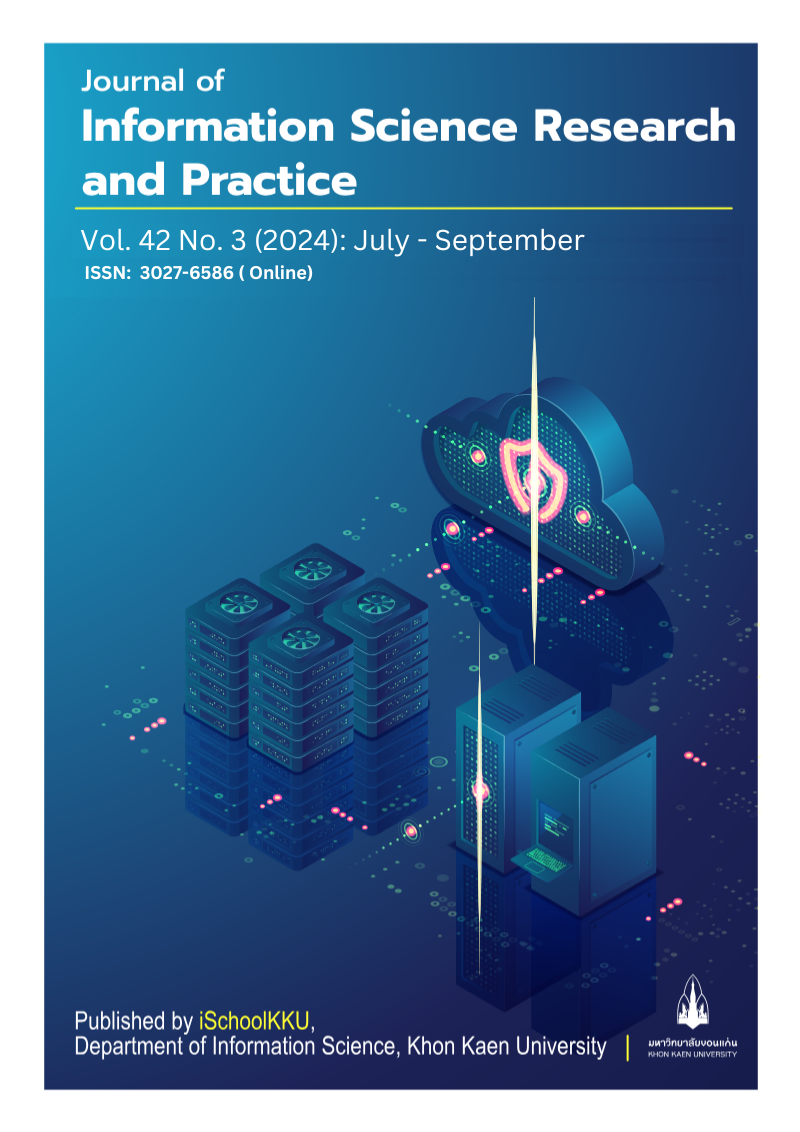A Structural Equation Model for the Development of Digital Skills in Undergraduate Students for the 21st Century
DOI:
https://doi.org/10.14456/jiskku.2024.19Keywords:
21st century skills, Digital literacy skills, Educational institutionsAbstract
Purpose: To analyze a structural equation model for the development of digital skills in undergraduate students for the 21st century.
Methodology: This study is a quantitative research that used a questionnaire with a sample group of 400 undergraduate students from 12 higher education institutions. A multi-stage sampling method was employed, and the data were analyzed using structural equation modeling.
Findings: The results of the structural equation modeling analysis indicate that the model's fit indices are as follows: GFI = 0.98, CFI = 0.99, AGFI = 0.95, p-value = 0.11, and RMSEA = 0.02. These fit indices meet the specified criteria, leading to the conclusion that the developed digital literacy skills curricula for undergraduate students in higher education institutions is consistent with the empirical data. The detailed analysis results are as follows: 1) 21st-century skills and collaboration skills together explain 88.0% of the variance in digital literacy skills. 2) 21st-century skills and collaboration skills have a positive direct influence on digital literacy skills, with statistical significance at the 0.01 level. 3) The variable of 21st-century skills has the highest influence on digital literacy skills, followed by collaboration skills.
Applications of this study: The results of this research can be used as a guideline for developing curricula in digital literacy skills for the 21st century for undergraduate students in educational institutions, promoting their digital literacy skills for both learning and working.
Downloads
References
Audrin, C., & Audrin, B. (2022). Key factors in digital literacy in learning and education: a systematic literature review using text mining. Education and Information Technologies, 27(6), 7395–7419. https://doi.org/10.1007/s10639-021-10832-5
Belshaw, D. A. J. (2011). What Is Digital Literacy? A Pragmatic Investigation. Doctoral dissertation of Department of Education at Durham University.
Cochran, W. G. (1977). Sampling Techniques. (3rd edition). John Wiley & Sons.
Gilster, P. (1997). Digital Literacy. New York: Wiley Computer.
Janyam, K. (2022). Essential Skills for Youth in the Workforce of the 21st Century: A Case Study of Southern Thailand. Journal of Yala Rajabhat University, 17(3), 127–137.
JISC. (2014). Quick guide—Developing students’ digital literacy. Retrieved from https://digitalcapability. jiscinvolve.org/wp/files/2014/09/JISC_REPORT_Digital_Literacies_280714_PRINT.pdf
Larson, L. C., & Miller, T. N. (2011). 21st Century Skills: Prepare Students for the Future. Kappa Delta Pi Record, 47(3), 121–123. https://doi.org/10.1080/00228958.2011.10516575
Ministry of Digital Economy and Society. (2016). National Digital Economy and Society Development Plan and Policy. Bangkok: Ministry of Digital Economy and Society
Ministry of Higher Education, Science, Research and Innovation. (2022). Total student reports for academic year 2022, semester 1, in all higher education institutions. Bangkok: Ministry of Higher Education, Science, Research and Innovation.
Office of the Civil Service Commission. (2020). What is Digital Literacy. Bangkok: Office of the Civil Service Commission.
Office of the National Digital Economy and Society Commission. (2019). Media and Information Literacy Summary Survey Report Thailand 2019. Bangkok: Office of the National Digital Economy and Society Commission.
Pacific Policy Research Center. (2010). 21st Century Skills for Students and Teachers. Honolulu: Kamehameha Schools, Research & Evaluation Division.
Partnership for 21st century skills. (2006). A State Leaders Action Guide to 21st Century Skills. Tucson.
Pengpit, P., Sukjairungwattana, T., & Chantaranamchoo, N. (2020). The factors relations the 21st century skills of undergraduate student’s Kasetsart University Kamphaeng Saen campus. Journal of education silpakorn university, 18(1), Article 1.
Phornprasert, W., & Suttipong, R. (2019). The development of students digital skill indicators in higher education institutions. Ratchaphruek Journal, 18(1), Article 1.
Rangsungnoen, K. (2022). Studying the 21st century essential skills of undergraduate students vocational education institutions according to the needs of the establishment. Vocational Education Innovation and Research Journal, 6(1), 150–156.
Schumacker, R. E., & Lomax, R. G. (2015). A Beginner’s Guide to Structural Equation Modeling (4th Edition). Routledge.
Siriluk, W., Prachanban, P., & Parnichparinchai, T. (2014). Indicators development of student’s skills in the 21st century. Journal of Education and Innovation, 16(4), 155–165.
Techataweewan, W., & Prasertsin, U. (2017). Development of digital literacy indicators for Thai undergraduate students using mixed method research. Kasetsart Journal of Social Sciences, 39(2018), 215-221.
Thanormchayathawat, B., Ratchathawan, R., & Wiriyasirikul, N. (2019). Factors influencing the development of 21st century learning skills among nursing students in Nakhon Si Thammarat. The Southern College Network Journal of Nursing and Public Health, 6(Special), 91-105.
Thongthep, K., Butkatunyoo, O., Lehmongkol, P., & Mahavijit, P. (2022). A study of project approach learning experience by using phenomenon- based learning provision to develop collaboration skills of young children. Journal of Education, Prince of Songkla University, Pattani Campus, 33(3), 151–167.
Turne, K., Leungratanamar, L., Niranra, S., Jarnareru, J., Wattanakul, B., & Reunreang, T. (2015). Twenty first century skills of nursing students of Boromarajonani Col-Lege of Nursing, Chonburi. Nursing Journal of The Ministry of Public Health, 25(2), 178–193.
Vanichbancha, K. (2019). Structural Equation Analysis (SEM) with AMOS (3rd ed.). Samlada.
Vanichbancha, K., & Vanichbancha, T. (2018). Using SPSS FOR WINDOWS to analyze data. (31st ed.). Samlada.
Vittaya-apibalkul, K., Hayeedareeyor, N., Botphiboon, U., & Termwitkhajorn, K. (2021). The development of learning skills in the 21st century and the design of a learning process plan for students of Faculty of Education, Yala Rajabhat University to community (Research report). Yala: Yala Rajabhat University.








